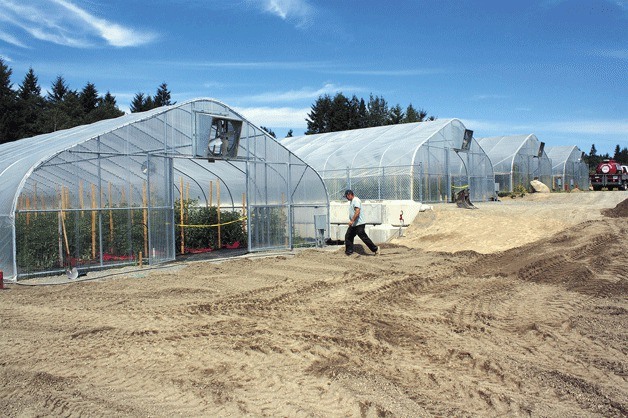A farmer sells produce to a grocer, who then sells it to customers.
Can there be a more direct way to get local food from a store?
Apparently, yes — if the farmer and grocer are one and the same.
For the past six years, Town & Country Market has been growing its own organic vegetables on a 15-acre farm on the corner of Wyatt Way and Weaver Road. Crops of zucchini, squash and pumpkins have all found their way to the produce departments at Town & Country, Central Market in Poulsbo and the company’s three outlets in Seattle when produce is plentiful.
But this year, Town & Country has expanded its efforts and has constructed two new greenhouses, doubling the 6,000 square feet of enclosed crops.
Town & Country has tried to be somewhat low-key about the project, shielding the farm from much publicity, until now.
“We’ve been very discreet about the farm these past years that we have been growing,” said Larry Nakata, chairman of the board at Town & Country Market. “The reason why is because before we talk about it we want to be comfortable that we’re doing things properly.”
“It’s been a real learning experience,” he added. “We’re still taking it slow.”
But with five acres of land currently being farmed, which includes four greenhouses and several row crops, Town & Country is making headway in providing their own local food.
“The Nakatas are very methodical,” said local farmer Brian MacWhorter, who was hired by Town & Country to manage the farm. “But when they do it, they do it right.”
MacWhorter, who owns Butler Green Organics and sells his produce to Town & Country, is given almost total leeway in what he grows at the USDA-certified organic farm.
Besides members of the squash family, MacWhorter grows tomatoes, beans, peppers, peas and Japanese cucumbers on the plot of land that boasted bumper crops of strawberries back in its heyday in the 1920s and ‘30s.
The farmland itself has remained in the Nakata family for generations. The name of the farm — MiddleField — is a translation of Nakata: the Japanese character “naka” means “middle” and “ta” means “field.”
“The MiddleField name has meaning,” said Nakata, who explained that his family’s roots in farming went back for generations.
MacWhorter said he was honored to be a part of the legacy of the land.
“I really respect what the Nakatas are doing with the heritage,” he said. “I’m really proud that the Nakatas are doing something for the people.”
In turn, Nakata praised MacWhorter for his role in making MiddleField a reality.
“Our original idea was to start small and learn as we go. Of course, with Brian’s expertise that’s worked out pretty well,” Nakata said.
Nakata said that with the farm well on its way in providing more local produce, it was time to get the word out about MiddleField.
“Our next step is to really communicate that story, especially to our customers,” Nakata said. “Knowing where your food comes from, we feel, is very important to our customers.”
While shoppers can expect pumpkins and squash in the months to come, the greenhouses (which mostly keep tomatoes) are not heated, meaning produce won’t be available in winter.
Nakata emphasized that MiddleField’s intention was never to supply the store with all its produce needs.
However, there is a stand in the produce section at Town & Country currently selling MiddleField zucchini, mixed beans and fava beans. While MacWhorter said that consumers should expect to pay more for quality local produce, the price of MiddleField zucchini, at $1.48 per pound, is the same as that of both organic and non-organic Northwest zucchini sold at the grocery.
“We want to be competitive across the (organic produce) market,” said Nakata, explaining that price will not be a sticking point.
“It is distinctive,” he said. “We’re growing it ourselves and it’s local. People appreciate the difference.”
The historical connection between the farmland and Town & Country also distinguishes MiddleField from other local farms.
Jitsuzo Nakata, Nakata’s grandfather, bought the property in 1924 from strawberry farmer Sakakichi Sumiyoshi to supplement the family’s income from the barbershop, laundry mat and bathhouse they owned in Winslow. He grew strawberries until World War II, when he and his family were deported to Manzanar during the internment of Japanese-Americans in 1942. A Filipino family tended the farm until the Nakatas’ return.
In 1957, Jitsuzo Nakata’s sons John and Mo, with Ed Loverich, opened Town & Country Market, which purchased the land from Larry Nakata’s cousins in 2001.
A few years later, after decades of fallowness, the land once again functions as a farm.
“Today, 88 years later, to still have that property connected to the family is really special,” said Nakata, who added that it was especially significant to him to have the land produce food once again.
“It’s also a reminder that (the) property represents to us the many friendships that we have been able to develop here on the island,” he said.
Nakata also praised the island’s many small farms in providing fresh and local food.
“To live in a community that can be more self-sufficient and sustainable is really nice to move toward,” Nakata said.
“We’re just doing a small part.”


